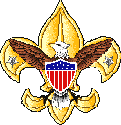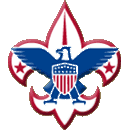Alternate Requirements for
Tenderfoot, Second Class, and First Class Ranks
A Scout who is unable to complete any or all of the requirements for
Tenderfoot, Second Class,
or First Class rank because he is physically or mentally
disabled may complete alternative requirements if the following criteria are met:
- The physical or mental disability must be of a permanent rather than
a temporary nature.
- A clear and concise medical statement concerning the Scout's
disabilities must be submitted by a physician licensed to practice medicine. In the
alternative, an evaluation statement certified by an educational administrator may be
submitted. The medical statement must state the doctor's opinion that the Scout cannot
complete the requirement(s) because of a permanent disability.
- The Scout, his parents, or leaders must submit to the Viking Council advancement
committee, a written request that the Scout be allowed to complete alternative
requirements for Tenderfoot, Second Class, or First Class
rank. The request must explain the suggested alternate requirements in sufficient detail
so as to allow the advancement committee to make a decision. The request must also include
the medical statement required in paragraph two above. The written request for alternate
requirements must be submitted to and approved by the local council prior to completing
alternate requirements.
- The Scout must complete as many of the regular requirements as his
ability permits before applying for alternate requirements.
- The alternate requirements must be of such a nature that they are as
demanding of effort as the regular requirements.
- When alternate requirements involve physical activity, they must be
approved by the physician.
- The unit leader and any board of review must explain that to attain Tenderfoot, Second Class,
or First Class rank a candidate is expected to do his
best in developing himself to the limit of his resources.
- The written request must be approved by the Viking Council advancement
committee, utilizing the expertise of professional persons involved in Scouting for
disabled youth. The decision of the council advancement committee should be recorded and
delivered to the Scout and his leader.
Alternate Merit Badges for the Eagle
Scout Rank
- The Eagle Scout rank may be achieved by
a Boy Scout or Venture Scout who has a physical or mental disability by qualifying for
alternate merit badges. This does not apply to individual requirements for merit badges.
Merit badges are awarded only when all requirements
are met as stated.
- The physical or mental disability must be of a permanent rather than
a temporary nature.
- A clear and concise medical statement concerning the Scout's
disabilities must be made by a physician licensed to practice medicine, or an evaluation
statement must be certified by an educational administrator.
- The candidate must earn as many of the required Merit badges as his ability permits before applying
for an alternate Eagle Scout rank merit badge.
- The candidate must complete as many of the requirements of the
required Merit badges as his ability permits.
- The Application for Alternate Eagle Scout
Award Merit badges must be completed prior to
qualifying for alternate Merit badges.
- The alternate Merit badges
chosen must be of such a nature that they are as demanding of effort as the required Merit badges.
- When alternates chosen involve physical activity, they must be
approved by the physician.
- The unit leader and the board of review must explain that to attain
the Eagle Scout rank a candidate is expected to do his best
in developing himself to the limit of his resources.
- The application must be approved by the council committee responsible
for advancement, utilizing the expertise of professional persons involved in Scouting for
the disabled.
- The candidate's application for Eagle must be made on the Eagle Scout
Rank Application, with the Application
for Alternate Eagle Scout Award Merit badges attached.
|
The
ScoutingBSA.org web site is a
legacy site of the Viking Council BSA, now Northern Star Council.
This site was the original council site and was active from 1996 to
2002 and run by volunteers. As the web became more important to
Scouting, the council took over with paid staff. This site is no
longer maintained but is an interesting snapshot of an early Scouting
web site. You can share your comments
using our
on-line form or
send a message to the
Webmaster. Thank you
for visiting! |
|

.jpg)

 Alternate Requirements
Alternate Requirements